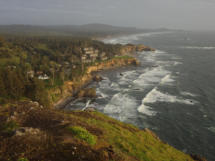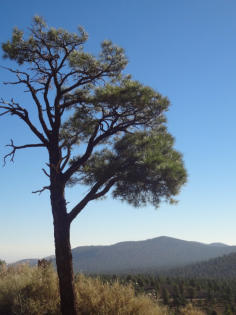




VISION
Cultural Direction
G












VISION AS CULTURAL
DIRECTION
Where Are We Going? How Are We
Getting There?
This website is designed to discuss various
issues surrounding environmental
problems and solutions, and to provide as
many local and other applicable resources
as possible. Northwestern New Mexico,
southwestern Colorado, northern Arizona
and coastal Oregon are covered in more
detail on this website, but other areas are
not ignored.
Does It Do Any Good to Vent Over
Concerns? Does Fuming and Fussing
Help?
Does it do any good to discuss greed, self-
centeredness, low vision and inadequate
education as lurking culprits behind this
permanent devastation? Does casting a
judgemental and angry voice do any good?
Not unless we turn our concerns into
something positive. We can allow our
dismay, grief, outrage and downright anger
fuel useful and well thought out alternative
approaches so we don’t keep making the
same mistakes repeatedly. We have to find
a system, or a way, which penetrates the
sluggishness and self-sabotage and takes
us to another dimension. We have to re-
qualify values/approaches and re-quantify
activities/outputs so that what is important
or meaningful takes on different tones.
Example of One State with Heavy
Devastation of Forests
What happened to the forests in Oregon is
tragic – pristine rainforests demolished by
our own government, businesses and
countrymen – truncating forever the special
beauty and qualities of that area. Anyone
with any sensitivity to the natural world has
to be moved by the destruction plainly
visible there. We are talking hill after hill,
expanse after expanse - the only remaining
section of coastal rainforest is the Oswald
State Park not that far from the Washington
state line. Everything else has been
obliterated and either turned into endless
stretches of tree farms with trees lined up
in sameness and size - or left barren.
Americans in Oregon who allowed or
directly participated in the widespread
destruction of their truly unique and
magnificent coastal forests and coastlines
were not prepared to deal with economic
issues beyond a certain level; in addition,
because the mindset of the area was that it
was easier to cut down trees rather than to
come up with alternative solutions for more
immediate turnaround money, people
repeatedly got off the hook for shallow
thinking and grunt work (lumberman)
activities. They removed from the rest of
their society and the world treasures which
can never be recovered because they saw
value in the money from the trees, not the
forests themselves and their other benefits
(like clean air from the pollution
ameliorating old growth trees, emotional
health and well-being benefits, aesthetics,
etc).
The Oregon coastline will never be the
same again. It’s over. What is left is a
pitiful reminder of the once reigning
grandeur of the area. Oregonians were not
prepared to push themselves a step further
to think out more creative solutions for
survival, economic viability and
employment more productively beyond
going after non-renewable resources, but
this was not just an Oregon thing – it was
an American and it was broad-based
societal thing. In many ways Oregon ts
themselves and their other benefits (like
clean air from the pollution ameliorating old
growth trees, emotional health and well-
being benefits, aesthetics, etc).
VISION OF spark peace doing cultural direction (here) heightened awareness speak out biodiversity economic vitality folly
The Oregon coastline will never be
the same again.
It’s over. What is left is a pitiful reminder of
the once reigning grandeur of the area. The
photo above shows a patch of the old
Oregon Coast - a glimpse of the dense
thickets which once completely covered
the areas along the coastline. Although
Native Americans used to burn areas for
various reasons, most of the forest was left
alone. When the western settlements
came in, along with the demands for jobs
and western concepts of progress, forests
were treated like second-rate expendables,
not relished or thought of as having
intrinsic value in and of themselves.
Oregonians were not prepared to push
themselves a step further to think out more
creative solutions for survival, economic
viability and employment more
productively beyond going after non-
renewable resources, but this was not just
an Oregon thing – it was an American and
it was broad-based societal thing. In many
ways Oregon has shifted its approach to
the rest of its forests but it is too late for
the coastal forests.
Oregon Not Unique
What happened in Oregon has happened
all across the United States and other
areas in one way or another. It is
happening in the Four Corners and other
oil and gas resource-rich areas the people
with money in these areas are spending
yet more money, education, technology
and time figuring out ways to get more oil
and gas rather than identifying alternative
energy solutions with concomitant jobs
and environmental health. This behavior is
going on right now as we speak –
petroleum leaders strategizing how to
obtain more of this or that out of the
ground rather than figuring up new ways to
get solar, wind and other renewables into
the area. Millions of dollars go into the
petroleum world feeding a dead-end
system. In addition, the people who are
in these industries tend to take a culturally
different viewpoint as a whole to the areas
in which they live as well as the world; they
may have a consumer driven approach to
the land, housing, development, as well as
resources in such a way progress looks
more like urban sprawl than wise and
efficient use of the area. You can see it run
through the social systems in all areas
with employers who tend to consume non-
renewable resources – you find it in the
politicians, the religious leaders, the
lenders, the real estate developers, and so
on.
They may keep an area tied up and
unavailable as a whole to new ideas and
approaches with softer, gentler
relationships to the natural world and our
environment and with more efficient
approaches to real progress. The culture
in these areas may be downright resistant
to anything other than the superficial look
of activity and development, no matter the
cost to the environment. In addition, the
culture might not realize that what they
think is minimal destruction for a good
cause (ie, economic development) is
actually major destruction for a relatively
trivial personal or corporate cause.

Cultural Blinders
The culture might create blinders because
people are not prepared to be sensitive to
nature and the world around them beyond a
certain point.
In short, we need to prepare all people to
rethink how to approach economic
problems in our lifetimes without using
crisis management and easy money tactics.
This Website Makes Available Various
Sources
The resources on this website include
information on a variety of topics, including
both human as well as environmental
issues. We will consider social behaviors
which tend to discourage environmental
degradation while encouraging healthy,
happy and productive lifestyles. It is for this
reason the arts, social sciences, psychology and other topics are discussed here. It’s how
people think about themselves and the world which starts the ball rolling either for or
against a healthy planet. What people are taught at home, schools, political institutions,
religious groups, employers and neighbors (neighbors, strangely enough, can keep each
other in the same bucket through gossip and cultural or religious pressures.
These pressures can generate fear of rocking the boat or being different) largely
influences how people treat this planet. If it is socially normal and acceptable to wipe out
resources in an area with a focus on jobs, then alternative ways of making money become
very difficult because people are locked into boxes of fear and lower vision. It is often
culturally driven how far people will go to reconsider their choices and new approaches. If
people feel the only way to get a job is to get one from employers who exploit the
environment and pollute our air, water and soil, it makes it hard to pull out of that grind.
On the other hand, if people are willing to open new businesses and create ways that help
the planet, we are much better off with that kind of thinking.
Broader Humanistic Considerations Go Along With Environmentalism
Being able to pull out of the grind often means digging deep into our human selves to give
ourselves permission to look at things in a new way and to take risks. It means
recognizing and acknowledging that if at basic core levels people are not treated well, they
will turn around and abuse themselves, others and the planet. So a key point made on
this website is that people need to learn to speak and act gently with their children and
each other at home, on the job and around town. Rough handling starting early in life
predisposes people toward lowered sensitivity, degraded or limited intelligences and it
hinders creative thinking. Abuse leads to shrunken visages and feelings; this reduced
state means people are less inclined to work out healthy solutions. Another way to put it
is if people feel tense from some ongoing fear of reprisal or punishment, they won’t be
able to openly accept differences and a variety of choices. We need people healthy and
happy in our societies. It starts at home..
updated 11/17/2017; 11/16/2017; 04/09/2015



- INDEX - environment
- INDEX resources
- Animal Issues
- Env. concerns SW
- Fukushima
- Fukushima website links-summary
- Recycling
- Water
- Renewable energy
- water issues
- sustainable practices
- Connecting for Conservation
- Libraries & Museums
- Media In Area
- Museums & Archaeology
- Food Competence & Gardening
- Oregon Coast Deforestation
- Schools Nature, Biology, Etc.
- Resources General Environmental
- Solar pros & cons
- Land Use









